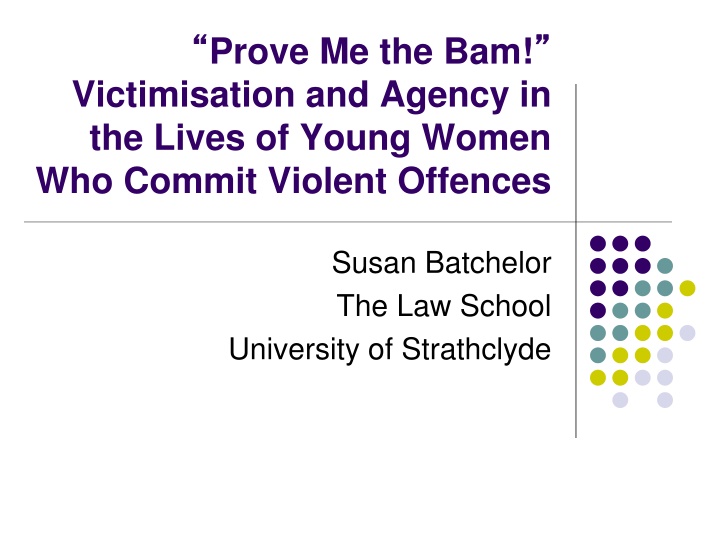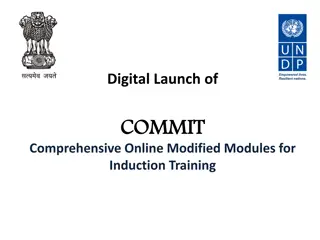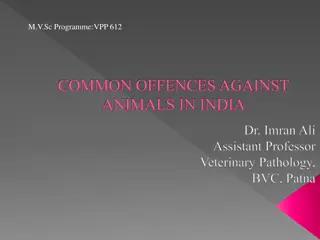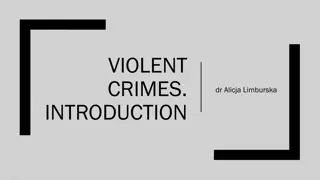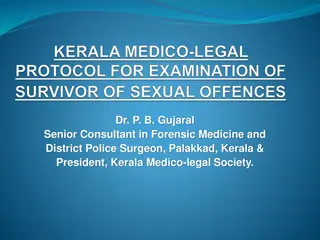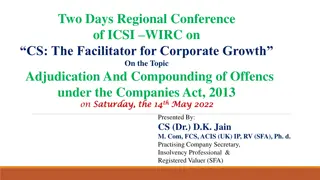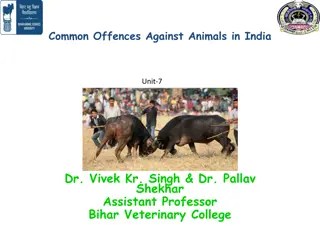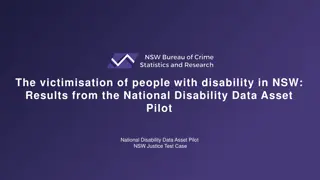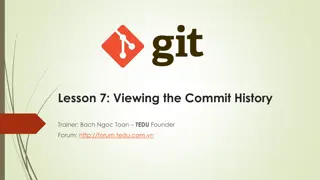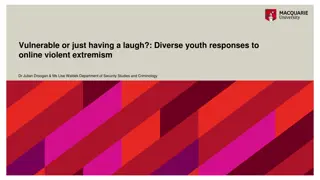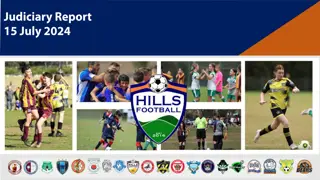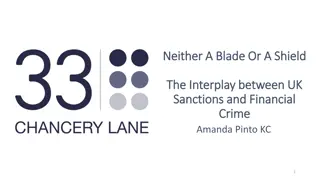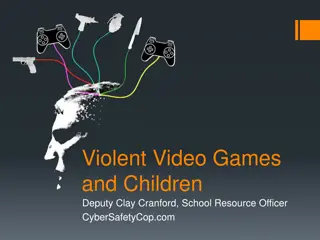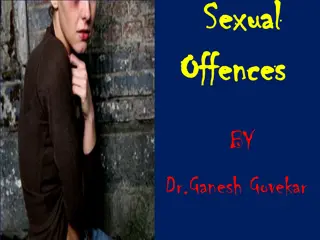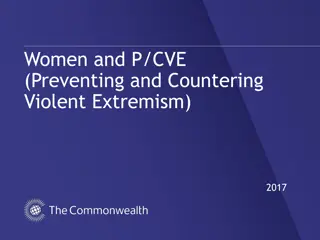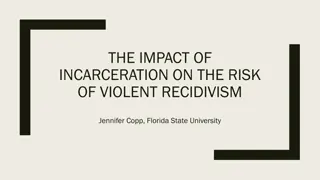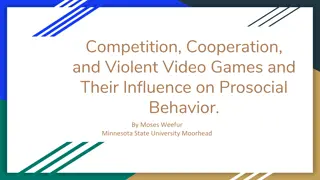Victimisation and Agency in Young Women Who Commit Violent Offences
This study delves into the victimisation and agency experienced by young women who commit violent offences, exploring their subjective perceptions of violence, sources of self-perception, impact on behavior, and portrayal in societal discourses.
Download Presentation

Please find below an Image/Link to download the presentation.
The content on the website is provided AS IS for your information and personal use only. It may not be sold, licensed, or shared on other websites without obtaining consent from the author.If you encounter any issues during the download, it is possible that the publisher has removed the file from their server.
You are allowed to download the files provided on this website for personal or commercial use, subject to the condition that they are used lawfully. All files are the property of their respective owners.
The content on the website is provided AS IS for your information and personal use only. It may not be sold, licensed, or shared on other websites without obtaining consent from the author.
E N D
Presentation Transcript
Prove Me the Bam! Victimisation and Agency in the Lives of Young Women Who Commit Violent Offences Susan Batchelor The Law School University of Strathclyde
Introduction Background Public and professional interest in VYW YW who commit violent offences: the facts The research: Pathways through Violence Design and methods Profile of young women Young women s accounts You can t rely on anyone It s better a sair face than a red face Implications for practice 27/04/05 GGSW Research Seminar 2
Background We are dealing with more and more drunken and violent young women in our town centres [ ] it s a worrying problem that we need to look into. (John Vine, President of ACPOS, 2004) In the absence of good public information, single incidents about women offenders can lead to misinformation about the nature of women s offending and the punishments they receive. This makes it hard for service providers to form a clear view about how well their services are targeted and how effective they may be. (SWSPIS, A Safer Way, 1998) 27/04/05 GGSW Research Seminar 3
The facts Table 1. Number of females with a charge proven for non-sexual crimes of violence, including handling an offensive weapon, Scotland, 1993-2002* Age 1993 1994 1995 1996 1997 1998 1999 2000 2001 2002 Under 21 years 35 29 52 66 61 77 92 96 72 103 21-30 years 90 68 100 111 123 109 123 111 139 172 Over 30 years 84 84 89 107 106 116 133 108 117 138 Total 209 182 241 284 290 302 348 315 328 413 Source: Criminal Proceedings in the Scottish Courts 1993-2002. *The figures for 2001 and 2002 include data relating to handling an offensive weapon , which were moved from the non-sexual crimes of violence group to other crimes in 2001
The data in context Violent crime accounts for just over 1 percent of the total crimes and offences committed by women in Scotland In 2002, 289 women had a charge for a non- sexual crime of violence proven against them in Scotland, compared with 1,900 crimes of violence committed by men 27/04/05 GGSW Research Seminar 5
Research objectives to explore the subjective meanings of violence held by violent young women; to investigate the sources of those self- perceptions, according to young women themselves; to examine the ways in which these impact upon sense of self and contribute to violent behaviour to examine the portrayal of violent young women in professional and popular discourses to track the trajectory of individual offenders, exploring how structural divisions and situational context are related to young women s violence (and subsequent disposal), and the inter- relationships between them to promote policy development in crime prevention, the CHS, the CJS, the penal system, & related support systems 27/04/05 GGSW Research Seminar 6
Research methods Sample 38 young women aged 25 and under serving custodial sentences for violent offences in HMPYOI Cornton Vale (August 2001) 21 of these YW interviewed as part of study Research methods Oral-history interviews with YW (N=23) Documentary analysis (prison records, social enquiry reports, trial judge reports) Semi-structured interviews with professionals (N=12) 27/04/05 GGSW Research Seminar 7
Offence types Table 2. Number of violent offence types Violent offence classification as recorded in SPIN Assault Carrying a Knife Assault and Attempted Robbery Assault and Robbery Assault to Severe Injury Abduction, Assault to Severe Injury and Robbery Assault to Severe Injury and Permanent Disfigurement Assault to SI and PD and Attempted Robbery Assault to Danger of Life Abduction, Assault and Robbery, and Attempted Murder Attempted Murder Culpable Homicide Total Number of YW 6 1 1 1 1 1 3 2 1 1 2 1 21
Violent offender typology An ordinarily non-violent young woman, who attacks her abuser whilst under the influence of alcohol. (N = 1) Younger offender who drinks heavily and experiments with recreational drugs and/or abuses prescription medication. Offence typically relates to a fight that is initiated whilst the offender is out of it and where things get out of hand resulting in the victim receiving a severe injury, sometimes due to the use of a weapon. Victims are generally (but not solely) other young women. (N = 12) Habitual drug user who assaults police/ security guards/ householder when she gets caught soliciting/ shoplifting/ burgling (to finance drug habit). Offender is generally intoxicated at the time of the offence and considers her actions to be in self-defence. (N = 5) Drug-dependent offender who assaults and robs unknown victims, often threatening them with a weapon. This group of offenders have extensive histories in care, poor relationships with their parents (particularly their mothers) and experience of physical and sexual abuse within the family. (N = 3) 27/04/05 GGSW Research Seminar 9
Context of offending Family problems Experience of abuse Institutional care Drug and/or alcohol abuse Suicide and self-harm Education, unemployment, and economic deprivation More pronounced, poly-substance misuse; higher levels of self-injury; more likely to be referred on grounds relating to own problem behaviour; higher attainment 27/04/05 GGSW Research Seminar 10
Young women s accounts YW made a distinction between being a violent person and having the potential for violence Things that the YW said made them angry being mistreated or let down being denied agency and respect 27/04/05 GGSW Research Seminar 11
You cant rely on people The importance of family Ma family s stood by me through everythin . They have. Every single thing, ma family s stood by me. I couldnae ask for a better family [ ] They ve never wance asked me what happened, they ve never expected nothing fae me. (Cathy) 27/04/05 GGSW Research Seminar 12
You cant rely on people Physical abuse I never got on with my dad. He is quite violent, so I ended up getting put into care [ ] I used to get beaten up with the baton a lot, or the belt [ ] It was if he was in a bad mood, like if you put too much sugar in his coffee or some hing, or you made a noise when he was trying to watch the racing. Ken, something stupid. [ ] I resented my mum for standing and watching it all happen and not doing anything. I still to this day don t understand why she done that [ ] She doesn t show any emotions of any kind. Even anger, she can t really be angry. When she is angry, she just goes quiet. Never ever in my whole life had she told me that she loves me. Never. Not once. (Karen) 27/04/05 GGSW Research Seminar 13
You cant rely on people Sexual abuse When I stayed wi ma wee gran my papa wis abusing me. He abused me fae when I wis three til I wis 11. And ma ma knew all aboot it and didnae tell anyb dy, cause it had happened tae her as well and she jist let it happen. [ ] I hate whit she done tae me, but I love her. (Debbie) 27/04/05 GGSW Research Seminar 14
You cant rely on people Domestic violence I used to see ma dad battering ma mum and I didnae like it. Ma mum used tae sit and take it from him. Then one day I ve sat and went like that, How is she letting a man hit her? How does she take that? That s when I started fleeing aboot him, scratching his face an hitting him an that. (Stephanie) 27/04/05 GGSW Research Seminar 15
You cant rely on people Bereavement Ma da and ma big sister got killed when I was only 15, so I was kinda fucked up aifter all that [ ] I never gret or nothin and I wouldn t go down tae the graveyard. I just kept bottling it up and then I just flipped [ ] I d been standing drinkin a bottle of Bud and I just pure lost the plot [ ] I ran up tae her and I skelped her wi the bottle [ ] Ma faither and sister s anniversary had just been and see when it comes tae the anniversary ma heid starts daein overtime and I end up blankin it oot and I just blanked it oot for so long that I just lost it that night. (Judy) 27/04/05 GGSW Research Seminar 16
You cant rely on people Lack of support I started going oot wi this guy that was always in and oot the jail a the time [ ] and ma mum and dad didnae approve. Naebody would gie him a chance or anything and then I fell pregnant at 17 [ ] Ma wee lassie s dad, he got aboot two year when she was five months old [ ] He got oot in the January and he died in August. I still loved him and everything. I couldnae go with him because ma mum and dad just wouldnae have it [ ] Once he died I just hit rock bottom. [ ] I really couldnae cope by myself and I didnae want to tell ma mum and dad that I couldnae. (Lesley) 27/04/05 GGSW Research Seminar 17
You cant rely on people Disloyalty When she done it, it hurt. You are trying to help somebody oot who s in need and basically she threw it back in ma face [ ] I had gave her the trust to come in and oot whenever she pleased [ ] She just threw all that back in ma face. (Angela) 27/04/05 GGSW Research Seminar 18
You cant rely on people Protective action I always hink the worst of everybody and I don t like letting people near me because I get hurt. So I d rather hurt them before they hurt me. (Cathy) You can t rely on other people. You ve only got yersel . When you think aboot it, it s just you. [ ] The folk I ll sit doon and take drugs wi are not really pals, they re acquaintances that I know. I don t really like them. You re just that wasted that you just don t care who you re sittin wi . You talk to them anyway, you re not bothered what they ve done tae you or what they re thinking aboot doing tae you. You re just not bothered. (Carol) 27/04/05 GGSW Research Seminar 19
Better a sair face than red face In search of respect If you let people walk all over you, people will and people do [ ] See if you stand back and let them hit you, they will keep hitting you. If you hit them back, then they usually stop. You have to be violent in here because I would say 70 percent of the lassies are violent, so if you re not then you won t get nowhere. You get bullied and you don t get any respect. It s simple. (Karen) 27/04/05 GGSW Research Seminar 20
Better a sair face than red face A necessary survival strategy I got put in with this girl and her fag went oot and I says, Cool doon! You ll get a light. We ve only got 10 minutes to go! and she went, You shut up! I went, Who are you telling to shut up, you bam?! She went, You re the bam! I says, Prove me the bam! and she went, Naw, you prove me the bam! I says, Naw, you prove me the bam! [ ] and she jumped up and grabbed us. I was like that, I ll have tae fight fer maself here and I just started punching fuck oot er. (Stephanie) 27/04/05 GGSW Research Seminar 21
Summary Importance of social, material and gendered contexts of offending Families as a source of anger and frustration The world as a dangerous and hostile place Violence as a rational response to harms 27/04/05 GGSW Research Seminar 22
Official policy responses Cognitive behavioural approaches young women s violence is the result of distorted thought processes Decontextualises women s offending Responsibilises individual women A Safer Way Women s offending often rooted in poverty IAF First Year Report Women who offend share three characteristics, namely Addiction, Abuse and Anxiety or other forms of psychological distress; their offending is closely related to these characteristics, directly or indirectly The problem is in their heads, not their social circumstances (Carlen 2002) 27/04/05 GGSW Research Seminar 23
Working with young women Low numbers A difficult group to work with? Gendering needs Practical help Victimisation Anger Relationships 27/04/05 GGSW Research Seminar 24
Relationships and respect In here they treat you like dirt and that annoys me. Like for instance there s always certain members of staff won t say, Will you do it? They say, Go and do it [ ] They see it as we re prisoners so we need tae do it. They don t treat us wi respect. Like if they are busy in the office it s like, Go away! [ ] That just causes you to say, Well, fuck off! It just starts a big battle. (Annie) 27/04/05 GGSW Research Seminar 25
Further information Batchelor, S. (2001) The Myth of Girl Gangs , in Criminal Justice Matters 43. Batchelor, S. (2005, forthcoming) Prove me the bam! Victimisation and agency in the lives of young women who commit violent offences , in Probation Journal 52 (4). Batchelor, S. and Burman, M. (2004) Working with girls and young women , in G. McIvor (Ed.) Women Who Offend. London: Jessica Kingsley. Batchelor, S., Burman, M. and Brown, J. (2001) Discussing violence: let s hear it for the girls , in Probation Journal 48(2). Batchelor, S. and McNeill, F. (2005) The young person-worker relationship , in T. Bateman and J. Pitts (eds.) The RHP Companion to Youth Justice. London: Russell House Publishing. susan.batchelor@strath.ac.uk 27/04/05 GGSW Research Seminar 26
